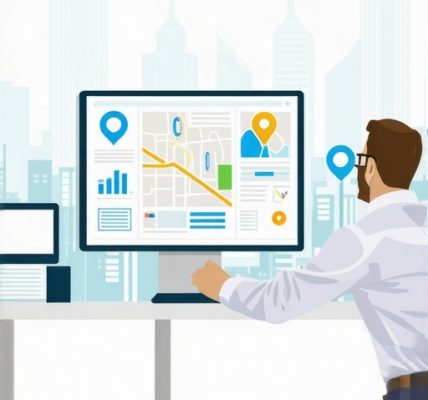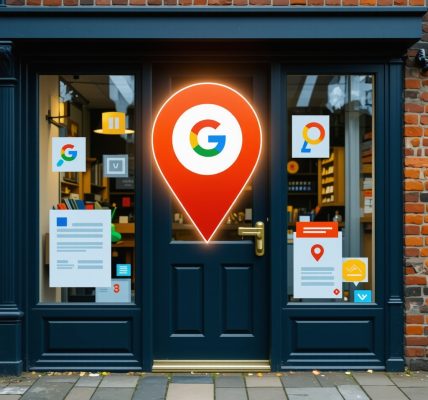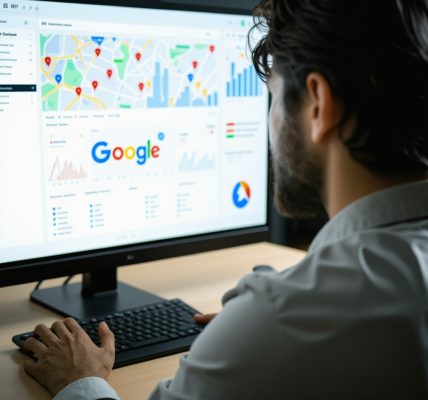Unlocking the Power of Local SEO: Your 2025 Competitive Edge
In an era where digital presence can make or break a local business, mastering local SEO has never been more crucial. As 2025 unfolds, the landscape of local search engine optimization evolves with new algorithms, user behaviors, and technological tools. This Local Business SEO Checklist unveils essential steps to help your business not only appear but thrive in local search results, driving foot traffic and customer engagement like never before.
Crafting a Magnetic Google Business Profile That Converts
Your Google Business Profile (GBP) is the cornerstone of local SEO success. Beyond the basics of NAP consistency (Name, Address, Phone number), optimizing your profile with strategic keywords and compelling business descriptions is key. Incorporate relevant LSI keywords such as local services, near me searches, and customer reviews naturally to enhance visibility. Regular updates and engaging posts keep your listing fresh, signaling to Google that your business is active and trustworthy.
How Can Optimizing Your Google Business Listing Maximize Local Search Impact?
Experts agree that a meticulously optimized Google Business Listing significantly elevates your local search rankings. This involves not only accurate location data but also leveraging features like Q&A sections, photos, and Google Posts. For instance, businesses that frequently post updates and respond to reviews tend to secure higher positions in Google’s Local Pack. Utilizing tools such as BrightLocal or the insights provided by GMB performance metrics can provide actionable data to refine your strategy continuously.
Beyond Basics: Advanced Citation Management and Local Authority Building
Local citations remain a vital factor for local SEO authority. However, the quality and consistency of citations are paramount. Engaging in smart citation management strategies helps avoid duplicate or outdated listings that can confuse search engines. Integrating authoritative citation sources and managing them proactively accelerates your local search authority. Consider exploring advanced techniques outlined in effective GMB citation management to stay ahead.
Harnessing Customer Reviews to Skyrocket Credibility and Rankings
Customer reviews are not just social proof; they are a dynamic ranking factor. Encouraging positive reviews through exceptional service and timely requests can exponentially boost your ranking and local trust. Responding thoughtfully to all reviews, including negative ones, demonstrates engagement and can turn potential detractors into loyal customers. For comprehensive strategies, see the best practices for GMB review generation.
Technical SEO Tweaks: Speed, Mobile Optimization, and Localized Content
Technical factors like website loading speed and mobile responsiveness directly influence local SEO performance. Google prioritizes user experience, especially for mobile users searching for nearby businesses. Additionally, creating hyperlocal content tailored to your community’s interests and events boosts relevance and engagement. Embedding local keywords judiciously within blogs, FAQs, and landing pages supports this effort, enhancing your site’s topical authority.
Insightful Analytics: Using Data to Refine Local SEO Efforts Continuously
Monitoring and analyzing local SEO metrics is a hallmark of experienced practitioners. Using Google My Business analytics alongside tools like Google Analytics and specialized local SEO platforms allows for data-driven decisions. Tracking metrics such as search queries, click-through rates, and customer actions helps pinpoint what works and where to pivot. For advanced guidance on leveraging GMB analytics for growth, explore local business SEO growth strategies using GMB analytics.
Integrating these essential steps into your 2025 local SEO strategy empowers your business to stand out in a crowded marketplace. Ready to elevate your local SEO game? Share your thoughts or experiences below and explore more expert insights to stay ahead of the curve.
For authoritative insights on local SEO trends and tactics, refer to Moz’s comprehensive guide on Local SEO, a trusted resource in the SEO community.
Why Consistency in Citation Management Feels Like Taming a Wild Beast
Managing local citations has personally felt like trying to tame a wild beast at times. I’ve experienced firsthand how duplicate listings and inconsistent information can confuse not only potential customers but also search engines. Imagine a customer finding two slightly different addresses for your store — frustrating, right? That’s why maintaining citation accuracy across platforms such as Yelp, Bing, and niche directories has become a non-negotiable part of my SEO routine.
One strategy I swear by is using a centralized tool for citation management, which helps me keep track of where my business is listed and ensures every detail matches perfectly. Tools like BrightLocal have been lifesavers, helping to automate this audit process and providing alerts when inconsistencies pop up. This proactive approach has definitely contributed to improved local rankings and stronger brand trust.
Building Local Authority Through Smart Citation Practices
Citations are not just about quantity but quality. I’ve learned that aligning with authoritative and relevant directories can significantly boost your local SEO authority. For example, being listed on industry-specific platforms adds weight to your business credibility.
In my experience, combining this with a well-optimized Google Business Profile creates a powerful synergy for local search dominance. It’s like having a well-tuned orchestra, where every citation plays its part harmoniously.
What Are Some Creative Ways to Encourage Genuine Customer Reviews?
Customer reviews can be the secret sauce to skyrocketing your local business’s credibility. From my perspective, asking for reviews doesn’t have to feel pushy. Instead, I like to integrate review requests naturally into the customer journey. For instance, after a positive interaction, a simple, personalized email or SMS asking for feedback often yields great results.
Another tactic I’ve tried is incentivizing reviews with small rewards or entry into contests — but always ensuring it complies with Google’s guidelines to avoid penalties. Moreover, responding to reviews, good or bad, has been a game changer. It shows potential customers that you care and actively engage, which builds trust and encourages more reviews.
How Data-Driven Insights Transformed My Local SEO Strategy
Embracing analytics transformed how I approach local SEO. By tracking metrics like clicks, calls, direction requests, and search queries through Google Business Profile insights, I could pinpoint which strategies were working and where improvements were needed. For example, I noticed a spike in “near me” searches after optimizing location-based keywords, which aligned perfectly with findings from Moz’s Local SEO guide.
These insights helped me tailor content, refine keyword targeting, and even adjust business hours during peak search times. It’s a continuous learning curve, but one that pays dividends in sustained local visibility.
If you’ve had experiences optimizing your local SEO or managing your Google Business Profile, I’d love to hear your stories or tips. Feel free to share in the comments below, and if you’re curious to explore more detailed strategies, check out the complete guide to mastering Google Business SEO for actionable insights.
Crafting Hyperlocal Content Ecosystems: The Future of Local SEO Authority
In 2025, local SEO transcends mere keyword stuffing and citation consistency. It demands a strategic content ecosystem tailored not only to your locality but also to the nuanced interests of your community. Creating hyperlocal content — such as neighborhood guides, event-based articles, and localized FAQs — positions your business as a trusted authority within your target area. This approach enhances topical relevance, which search engines increasingly prioritize when evaluating local intent.
Moreover, integrating multimedia elements like videos highlighting local events or customer testimonials can deepen engagement and reduce bounce rates. The synergy between compelling local content and a well-optimized Google Business Profile fortifies your digital footprint, enabling higher rankings in the Local Pack and organic results alike.
How Can Local Link Building Amplify Your Search Visibility Without Falling into Spam Traps?
Link building remains a cornerstone of SEO, but when it comes to local SEO, the strategy requires finesse. Quality over quantity is paramount to avoid penalties from search engines. Prioritize acquiring backlinks from reputable local organizations, chambers of commerce, local news outlets, and community blogs. These links not only pass valuable link equity but also signal your embeddedness in the local ecosystem.
Another effective tactic is sponsoring local events or charities, which often results in mentions and backlinks from authoritative regional websites. Guest posting on niche-relevant local blogs can also enhance your visibility and brand trust. Remember, all outreach should be authentic and contextually relevant to maintain credibility.
Leveraging Structured Data Markup for Enhanced Local Search Features
Structured data markup, particularly Schema.org implementations, is an advanced tactic that can unlock enhanced search features like rich snippets, knowledge panels, and event listings. Embedding LocalBusiness schema with precise NAP details, opening hours, geo-coordinates, and service areas helps search engines better understand your business context and present your listing attractively.
Additionally, integrating Review schema that highlights aggregated customer ratings can boost click-through rates by showcasing social proof directly in search results. Utilizing tools such as Google’s Structured Data Testing Tool ensures accurate implementation and helps identify errors that could undermine your SEO efforts.
Integrating Voice Search Optimization into Your Local SEO Workflow
With voice assistants becoming ubiquitous, optimizing for voice search queries has gained urgency. Voice searches tend to be more conversational and question-based, often including phrases like “near me” or “open now.” Incorporating natural language keywords and creating content that directly answers common questions enhances your chances of capturing voice search traffic.
For example, developing a comprehensive FAQ section tailored to voice queries can position your business as the go-to answer source. Additionally, ensuring your Google Business Profile is up-to-date with accurate hours and services is vital, as voice assistants heavily rely on this data.
Tracking Advanced Local SEO KPIs: Beyond the Basics
While clicks and impressions provide foundational insights, sophisticated local SEO practitioners monitor deeper KPIs such as driving direction requests, call actions, and even in-store visit estimations when available. These metrics offer a clearer picture of user intent and conversion potential.
Leveraging platforms like Google Analytics 4’s enhanced measurement and integrating CRM data can bridge the gap between digital engagement and offline outcomes. Regularly auditing these KPIs enables agile strategy adjustments, ensuring that SEO efforts translate into tangible business growth.
For an in-depth exploration of local link building strategies, refer to the expert analysis by Ahrefs on Local SEO Link Building, which offers actionable tactics grounded in real-world data.
Are you ready to elevate your local SEO strategy with these advanced techniques? Dive deeper into specialized topics or share your insights by engaging with our community below.
Decoding the Potential of Structured Data for Local SEO Excellence
Structured data markup is a highly sophisticated tool that local SEO experts deploy to elevate their search engine presence beyond traditional rankings. By integrating Schema.org LocalBusiness schema, businesses provide search engines with granular details such as precise location coordinates, operating hours, accepted payment methods, and service areas. This enhanced semantic context not only improves visibility but can also trigger rich search features like knowledge panels, event highlights, and review snippets, thus capturing user attention more effectively.
Ensuring flawless implementation via Google’s Structured Data Testing Tool is crucial to prevent errors that might undermine your SEO efforts. Such precision in markup signals search engines about the trustworthiness and relevance of your local business, often resulting in increased click-through rates and superior local pack placement.
Voice Search Optimization: Navigating the Conversational Query Revolution
With the proliferation of voice-activated devices, local SEO strategies must evolve to incorporate conversational and question-based queries. Voice searches typically involve natural language and long-tail phrases such as “best coffee shop open now near me,” demanding a shift from keyword stuffing to creating content that directly answers specific, localized questions.
Developing comprehensive FAQ pages tailored to anticipated voice queries significantly enhances your chances of being featured in voice search results. Additionally, maintaining up-to-date Google Business Profile information ensures voice assistants provide accurate responses, enhancing overall user experience and driving targeted traffic.
How Can Advanced Local Link Building Avoid SEO Pitfalls While Maximizing Authority?
Local link building remains an indispensable tactic, yet it requires careful curation to avoid spam penalties. Emphasizing quality over quantity, expert practitioners focus on acquiring backlinks from authoritative regional entities such as chambers of commerce, reputable local news outlets, and niche-relevant community blogs. Such backlinks not only boost domain authority but also embed your business firmly within the local digital ecosystem.
Moreover, sponsoring community events or supporting local charities often earns organic, contextually relevant backlinks, reinforcing authenticity. Strategic guest posting on vetted local platforms further amplifies visibility. Authenticity and relevance are paramount; all outreach must resonate genuinely with local audiences to maintain credibility and search engine favor.
Leveraging Advanced Analytics for Dynamic Local SEO Adjustments
Beyond basic metrics like clicks and impressions, expert local SEO practitioners track nuanced KPIs such as driving direction requests, phone call clicks, and estimated in-store visits. Integrating data from Google Analytics 4, Google Business Profile insights, and CRM systems provides a holistic view of customer interactions, enabling precise attribution of digital efforts to offline conversions.
Regular KPI audits empower agile strategy pivots, ensuring that SEO initiatives not only increase visibility but also translate into tangible business growth. This data-centric approach fosters continuous improvement and competitive differentiation in saturated local markets.
For a comprehensive dive into advanced local link building methodologies backed by empirical data, refer to Ahrefs’ expert analysis on Local SEO Link Building.
Ready to harness these cutting-edge local SEO tactics to dominate your market? Engage with our community or explore our extensive guides to transform your local search strategy into a powerhouse of growth.
Frequently Asked Questions (FAQ)
What is the most critical factor for improving local SEO rankings in 2025?
The most critical factor involves a combination of an optimized Google Business Profile with consistent and authoritative citations, alongside robust customer review management. These elements signal trustworthiness and relevance to search engines, while technical optimizations like mobile responsiveness and localized content further enhance rankings.
How often should I update my Google Business Profile to maintain strong local SEO?
Regular updates are essential; ideally, you should post fresh content, respond to reviews, and update business hours or services whenever changes occur. Frequent activity signals to Google that your business is active and engaged, which positively impacts your local search visibility.
Can structured data markup really influence my local search results?
Yes, implementing Schema.org LocalBusiness structured data helps search engines better understand your business details, enabling enhanced search features like rich snippets and knowledge panels. This can increase click-through rates and improve your prominence in local packs.
What strategies can I use to encourage authentic customer reviews without violating guidelines?
Integrate review requests naturally within your customer journey, such as follow-up emails or SMS after service completion. Incentivizing reviews with rewards must comply with platform policies to avoid penalties. Always respond thoughtfully to all reviews to demonstrate engagement and build trust.
How do I optimize my content for voice search in local SEO?
Focus on conversational, question-based keywords and create comprehensive FAQ pages that answer typical voice queries. Ensure your Google Business Profile is accurate and up-to-date, as voice assistants rely heavily on this data to provide relevant responses.
What are the best practices for local link building without risking spam penalties?
Prioritize quality backlinks from reputable local sources such as chambers of commerce, regional news outlets, and community blogs. Sponsoring local events or charities can generate organic, contextually relevant links. Authenticity and relevance in outreach are vital to maintain credibility and search engine favor.
Which advanced KPIs should I monitor beyond basic metrics to measure local SEO success?
Track driving direction requests, phone call clicks, and estimated in-store visits where possible. Integrating Google Analytics 4, Google Business Profile insights, and CRM data delivers a comprehensive view of user engagement, linking digital metrics to offline conversions.
How important is citation management and what tools can help streamline it?
Citation consistency is crucial to avoid confusion and improve local authority. Tools like BrightLocal automate citation audits, alerting you to duplicates or inaccuracies. Centralized citation management helps maintain uniformity across multiple directories and platforms.
What role does hyperlocal content play in establishing local SEO authority?
Hyperlocal content tailored to neighborhood interests, events, and FAQs enhances topical relevance and user engagement. This approach positions your business as a community authority, increasing trust and improving rankings in local search results.
How can I leverage analytics insights to continuously improve my local SEO strategy?
Regularly analyze search queries, click-through rates, and customer interaction data to identify successful tactics and areas needing adjustment. Data-driven decisions enable agile optimization, helping you stay competitive and responsive to evolving local search trends.
Trusted External Sources
- Moz Local SEO Guide: A comprehensive and authoritative resource offering deep insights into local SEO fundamentals, trends, and best practices, essential for understanding foundational and advanced tactics.
- BrightLocal: A leading platform specializing in citation management and local SEO analytics, providing practical tools and data to monitor and optimize local search performance effectively.
- Google’s Structured Data Documentation: Official guidelines and resources on implementing Schema.org markup correctly, crucial for enhancing local business listings with rich search features.
- Ahrefs Local SEO Link Building Analysis: An expert-backed, data-driven exploration of effective local link building strategies, highlighting how to earn high-quality backlinks while avoiding SEO pitfalls.
- Google Business Profile Insights: Direct analytics and performance metrics from Google’s platform, invaluable for tracking user behavior, engagement, and optimizing local visibility.
Conclusion
Mastering local SEO in 2025 requires a multifaceted approach that integrates precise Google Business Profile optimization, rigorous citation management, and proactive customer review engagement. Complementing these with cutting-edge techniques such as structured data markup, voice search optimization, and hyperlocal content creation positions your business to thrive in competitive local markets. Leveraging advanced analytics and trustworthy local link building further sharpens your strategy, driving meaningful offline outcomes and sustained growth.
By embracing these expert-informed tactics, your local business not only ranks higher but also builds authentic community authority and customer trust. Take the next step—apply these insights, share your experiences, and engage with expert communities to keep your local SEO strategy ahead of the curve.



